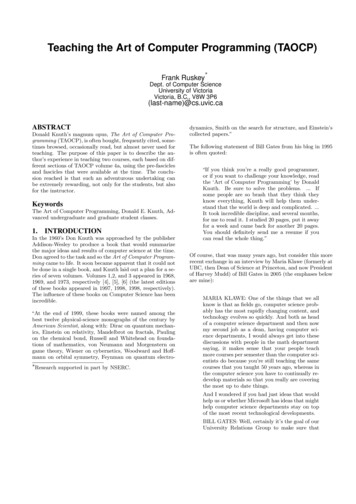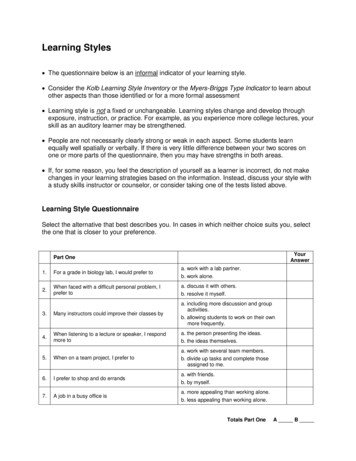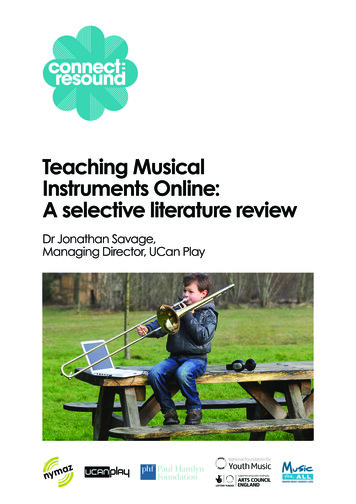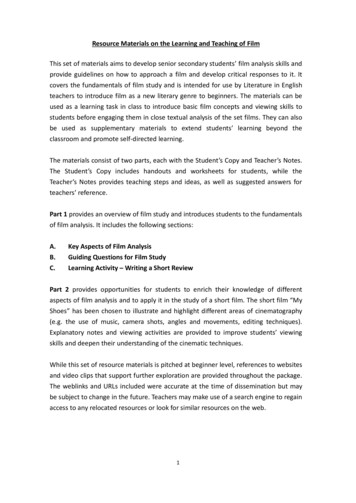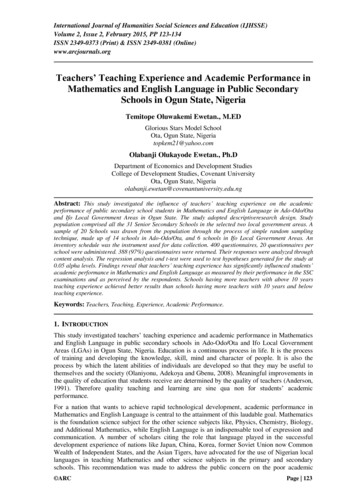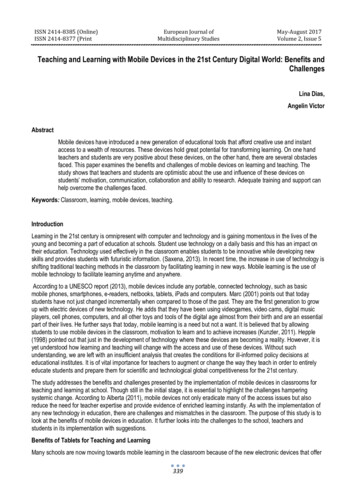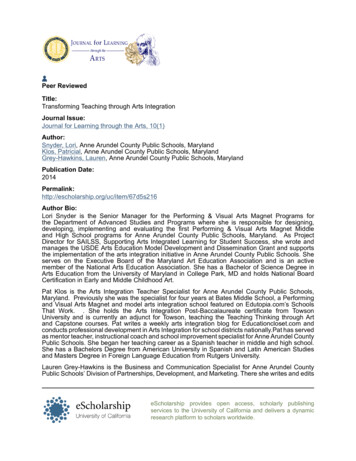
Transcription
Teaching the TriviumChristian Homeschooling in a Classical Style
Also by Harvey Bluedorn:BooksA Greek Alphabetarion, 1993Handy English Encoder & Decoder, 1994Vocabulary Bridges from English to Latin & Greek,1994Homeschool Greek, A Thorough Self-teachingGrammar of Biblical Greek, 1996The Covenantal Allegory, A Study of the CovenantPromises Made to Abraham, 1997PamphletsThe Biblical Evidence for House Assemblies, 1993Observations on the Order of the Assembly, 1994An Acceptable Sacrifice of Praise, 1995Woman’s Role in the Gathered Assembly, 1995On Family Worship, 1997The Sabbath Syllogism, 1998The Logical Defense of the Faith, 1998
Teaching the TriviumChristian Homeschooling in a Classical StyleFor the Lord giveth wisdom:out of His mouth cometh knowledgeand understanding.— Proverbs 2:6.by Harvey & Laurie BluedornMay 2001TRIVIUM PURSUIT
Teaching The Triviumby Harvey & Laurie BluedornLibrary of Congress Control Number: 2001117112Trivium PursuitPMB 168, 139 Colorado StreetMuscatine, Iowa 52761309-537-3641www.triviumpursuit.com Copyright 2001 by Harvey and Laurie Bluedorn. All rights reserved.This book was published in May of the year two thousand one by Harvey and Laurie Bluedorn. Teaching the Trivium is the private property of Harvey and Laurie Bluedorn. The right toreproduce or publish this material in any portion, in any manner, by any means, or for anypurpose, is reserved as the sole right of the authors, who hereby grant permission for brief quotesin critical articles or reviews, provided that the authors’ names and address are clearly cited, anda copy of the publication containing the article or review is forwarded to the authors.“Thou shalt not muzzle the ox that treadeth out the corn. And, The labourer is worthy of hisreward.” — First Timothy 5:18 (First Corinthians 9:9; Deuteronomy 25:4; and Luke 10:7; Matthew10:10; Deuteronomy 24:15)“Therefore, behold, I am against the prophets, saith the LORD, that steal my words every onefrom his neighbour.” — Jeremiah 23:30“. . . Thou shalt not steal, . . . Thou shalt love thy neighbour as thyself.” — Romans 13:9(Matthew 19:18; Mark 10:19; Luke 18:20; First Corinthians 6:8,10; Ephesians 4:28; Exodus 20:15;Leviticus 19:11,13; Deuteronomy 5:19 and Leviticus 19:18; Matthew 5:43; 7:12; 19:19; 22:39; Mark12:31; Luke 10:27; Galatians 5:14; James 2:8)“Render therefore to all their dues: . . . honour to whom honour.” — Romans 13:7“That no man go beyond and defraud his brother in any matter: because that the Lord is theavenger of all such, as we also have forewarned you and testified.” — First Thessalonians 4:6(Leviticus 19:13; Deuteronomy 32:35; Proverbs 22:22,23)Biblical quotations are either from the King James Version, common 1769 edition of Dr.Benjamin Blayney, or else they are our own very literal translation, abbreviated v.l.t. Occasionalcorrections of the KJV are enclosed in brackets. Alternate translations follow a forward slash [/abc],more literal translations follow a backward slash [\xyz].
Authors’ PrefaceWHEN WE WERE MARRIED in 1973, the term “Homeschooling” had not beencoined. Nevertheless, the Lord impressed upon our consciences at thattime the commitment to homeschool what children He might give us.The Lord blessed us with our first child in 1975. In 1980, we taught himhow to read, and we have since homeschooled all five children withwhom the Lord has blessed us.In 1989, we were asked by an Iowa Homeschool convention to give aseminar on teaching Latin, Greek, and Logic. We have now given seminars in forty-four states. We would never have chosen this role for ourselves. Others have called us to it.In 1993, we began a small magazine, called Teaching the Trivium, whichforced us to write down some of what we had learned – and were learning.After much and varied experience in homeschooling, in applying a classical model and method for education, in speaking, and in writing, weconcluded that it was finally an appropriate time for us to put togetherin an orderly manner those things about which we had learned. In thespring of 2000, we published a series of eight booklets called, The Teaching the Trivium Booklet Series. Within the Lord’s providence, we have nowtransformed and expanded those booklets into a complete book.We have subjected all of what we have written to criticism. Parts of thisbook have gone through twelve years of correction. We invite your furthercriticism for the improvement of any subsequent editions. We ask the Lordto make use of our labors, despite their faults.In this book, we lay down a spiritual and philosophical foundationand a practical program for Christian Homeschooling in a classical style.We can’t fill in all of the details to satisfy every situation. Instead, wegive our principles and suggestions, and we guide you to other sources.Our emphasis is communicating the picture and encouraging the practice. May it please the Lord to use this work to further His kingdom.
The book design and typography was by Nathaniel Bluedorn. Thescene in oils on the cover and the chapter title illustrations are byJohannah Bluedorn. The illustrations at the end of Chapter One are byHelena Bluedorn. This book would never have been completed withoutthe help of all our children.Harvey & Laurie BluedornApril, 2001
ContentsPart One25Chapter OneThe Transformation of Classical Education:A Biblical Vision for Homeschooling27Breaking out of the MoldWhat is Classical Education?Classical HumanismA Classical Model and MethodChristian Limits to Classical UsesWhat We Mean by “Classical”Transformation from the Inside OutThe Steps of TransformationThe Opinion of Scripture on Classical Greek EducationDistinctives of the Biblical Model of Education1. All true education must begin with the revelation of God.2. The family at home is given sole jurisdictionover the education of children.3. Education is to fully prepare children for adult life.4. The ultimate goal of education is holiness –separation to God for His service.Why Follow a Classical Model and Method?Don’t Try This at HomeThe Arrangement of This BookChapter TwoWho Should Control Education: Parents, or the State?IntroductionThe First and Great CommandmentThe Whole CommandmentAn Exposition of Deuteronomy 6:4-9The Unity CommandmentThe Education CommandmentThe Method of EducationThe Implications of this Commandment for the FamilyThe Broader Implications of This CommandmentSummary and ConclusionChapter ThreeShould Christians Prefer a Classroom School?IntroductionThe Biblical OrderWhy not Classical School?Ten Problems with Classroom 74850525556606161616364
1. Classroom schools create bonds which can easily crossand oppose the proper bonds of authority and affection.2. Classroom schools can create an atmosphere of ungodly rivalryinstead of godly challenge.3. Classroom schools create a cross-cultural exchangeoutside of the parents’ control, establishing valueswhich may conflict with those of the parents.4. Classroom schools can be academically inferior in many casessimply because of the inefficiency of teaching the identical materialto multiples of children at different learning levels.5. The age segregation of classroom schools encourages peer groupingsas the proper way of partitioning society.6. The gender mixing of classroom schools can create situationswhich are inappropriate.7. Time at school away from home, other after-school programs away from home,and schoolwork brought home from school – these all draw orderand commitment to the school and away from the family.8. There is an inherent contrast between: the tutorial-discipleship model,and the teacher-classroom model.9. When learning is artificially separated from real life,many things are left unlearned, creating a vacuum void of thingswhich need to be learned by daily example.10. Resources are imprudently consumed.The Problems with Classroom Schools – A ConclusionThe Homeschool AdvantageSome QuestionsCan Parents Handle Classical Education?How Long to Homeschool?Our Child Doesn’t Want to HomeschoolWhat About Emergencies?What About an Only Child?Summary and ConclusionSome Final WordsChapter FourWhat is the Trivium?IntroductionThe Classical TriviumThe Applied TriviumThe Trivium Model of Child Educational DevelopmentThe Trivium Method for Teaching SubjectsThe Scriptural TriviumAnalogy of the Trivium to a Building: Foundation, Structure, and UseAnalogy of the Trivium to Computers: Input, Processing, and OutputThe Development of Knowledge, Understanding, and WisdomTrivium TerminologyModern Education is DysfunctionalHarvard, 1643Three Observations on Modern Education1. Trivia, not Trivium.2. Interrupting the Learning Process.3. Regressive 8383848485868788909192929293939497
Trivium Based Education versus Outcome Based EducationThe Whole Trivium in a CapsuleThe PictureThe Early Knowledge Level (or Grammar Stage)The Knowledge Level (or Grammar Stage)The Understanding Level (or Logic Stage)The Wisdom Level (or Rhetoric Stage)The Final Finishing Level (or Stage)SummaryQuestionHow Can a Victim of Public School Remediate?Chapter FiveTeaching LanguagesAn Argument for Teaching Classical LanguagesWhy Study Other Languages?Christians Should Have Some Overriding ConsiderationsFurther Argument for the Study of GreekFurther Argument for the Study of HebrewFurther Argument for the Study of LatinPrinciples for Learning LanguagesWhich Languages to Study?If Only One Language, Then GreekIf Two Languages, Then Latin and GreekIf Three Languages, Then How About: Latin, Greek, and Hebrew?Levels of ProficiencyWhere Should We Begin?A General Course of StudyLevel One: Focus on Lexical Skill– Learning the Sights and Sounds of the Language.An Introduction to Ancient AlphabetsBeyond the AlphabetLevel Two: Focus on Grammatical Skill– Learning the Grammar and Syntax of the LanguageA Comparison of Ancient GrammarsThree Basic Approaches to Formal Grammar Study1. The Traditional or Deductive Approach2. The Natural or Inductive Approach3. The Programmed-Interactive ApproachSome Tips and Helps1. Alphabetics and Phonetics.2. Readings in the Language.3. Language Notebook4. Vocabulary Cards5. Reading and Memorizing6. Student Pace7. Reference Grammar8. Practice, Repetition, and Hard Work is Classical.Level Three: Focus on Fluency Skill– Learning to Translate and Interpret the 137137139141144144145145146146147147147147
Chapter SixTeaching LogicAn Argument for Teaching LogicWhat is Logic?Words, Sentences, and MeaningWhy is it Important to Study Logic?PolylogismLogic and MoralityLogic and A-moralityThe Spiritual Power of LogicWhat is Our Responsibility?What is Logic Useful For?The Rejection of Logic Leads to the Rejection of GodPrinciples for Learning LogicDefining and Describing LogicFormal LogicInformal Logic1. Classification2. Definition3. Argument4. Problem Solving5. Informal Logical Fallacies6. Propaganda Techniques7. Methods of ManipulationOverall Observations for Learning LogicLogic MaterialsPride, Sarcasm, Cynicism and LogicLogic NotebookStudy Logic TogetherBefore Age Thirteen – Focus on Elemental Logic SkillsAge Thirteen and BeyondA General Course of StudyA Three-Step CurriculumStep One: Beginning About Age Thirteen – Focus on Informal LogicStep Two: About Age Fifteen or Later – Focus on the Practice of LogicStep Three: About Age Sixteen or Later – Focus on Finer Details of LogicSome QuestionsChapter SevenTeaching RhetoricAn Argument for Teaching RhetoricPrinciples for Learning RhetoricDefining and Describing RhetoricThe Five Parts of Classical RhetoricSome Overall Observations for Learning Rhetoric1. Early Bloomers.2. Late Bloomers.3. Preparing Future Rhetoric Students.4. Learn Rhetoric by Doing It.5. Hard Work Will Pay in the End.6. Bible Principles for Rhetoric.7. Called to 182182183
8. Establish High Standards for Grammar and Logic9. Standards for Rhetoric.10. Boys and GirlsA General Course of StudyBefore Age Ten — Focus on VocabularyAges Ten Through Twelve — Focus on Spelling and GrammarAges Thirteen Through Fifteen— Focus on Composition, Argumentation, and SpeechAges Sixteen Through Eighteen — Focus on Research and DebateA Word About Political CorrectnessChapter EightPrinciples for the Study of LiteratureIntroductionCultural PrinciplesCultural ValuesCultural GoalsHow Should We Deal with Other Cultures?Paul at AthensLessons to Learn from Paul at AthensWhat Are the Classics?How To Classify LiteratureFour Categories of LiteratureChoosing What to ReadTo Burn or Not To Burn?Ten Principles for Choosing What to Read1. Do what is pleasing to the Lord.2. Do not follow the world.3. Do not allow the world to follow you.4. There is only so much time in the day.5. Older does not necessarily mean better.6. Is this profitable?7. Does this promote good habits?8. Will reading this further my education?9. Does this material have lasting value.10. When in doubt, leave it out.Where to Draw the LineAppropriate AgesReading CriticallyQuestions1. Don’t Godly Men in the Bible Pursue the World’s Wisdom?Examples or Exceptions?Paul’s Example2. Don’t We Need to be Culturally Literate?Cultural ResponseLiterature and HistoryCultural AcquaintanceMythologies: Ancient and Modern3. How Should We Approach Classical Literature?Raiders of the Lost Arts1. New Covenant Use.2. Practical 6
3. Apologetic Use.4. Educational Use.4. How Do We Maintain a Proper Separation?How Do We Stay Pure?Chapter NineAn Application of Principles for the Study of Historical LiteratureThree Underlying Principles For the Study of History1. Knowl
Teaching The Trivium by Harvey & Laurie Bluedorn Library of Congress Control Number: 2001117112 Trivium Pursuit PMB 168, 139 Colorado Street Muscatine, Iowa 52761File Size: 309KBPage Count: 65People also search forteaching the trivium pursuitteaching the trivium classic filmsthe triviumten year old writing homeschooletching

